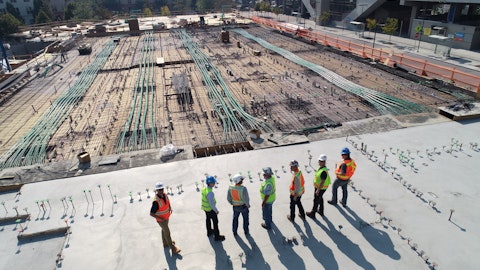Michael Griffin: Thanks, that’s helpful. Then just one on geographic performance, it seems like your commentary and expectations around EMEA and APAC are maybe a bit incrementally more positive relative to the Americas. I’m just curious if there’s anything driving those underlying assumptions – is it thoughts about economic growth or potential for a shallower recession there, but anything you can expand on, on performance of those other geographic segments, that’d be helpful.
Bob Sulentic: Well first of all, we are now not expecting a recession in Europe, and we expect Europe to trend better than the U.S. in terms of return to the office. Then you go to Asia, and we expect Asia to be almost like it was historically as it relates to return to the office, and we have very strong businesses particularly in Korea, Japan and China relative to what we’ve had historically and relative to our competition. We have a very strong business in Japan and we expect that business–it’s become quite large for us and we expect it to continue to grow. You have the economic backdrop that’s positive, relatively speaking, and then you have the circumstance related to return to the office that’s positive, relatively speaking, as you move from the U.S. to Europe to Asia, and then you have just the very strong relative business position that we have, particularly in Asia but also our businesses in Europe and the U.K. have gotten much stronger over the past few years on a relative basis, so you see all those things coming through.
Michael Griffin: Great, that’s it for me. Thanks for the time.
Operator: Thank you. Our next question is from the line of Jade Rahmani with KBW. Please go ahead.
Jade Rahmani: Thank you very much. First question would be if the move-in rates in the last couple of weeks have changed anything in terms of tone from major CBRE clients that you’re hearing.
Bob Sulentic: I don’t think it’s had a major impact, Jade. Everybody is in the–of the mindset that things are going to be uncertain for a while. I don’t think the view as to how the year is going to play out has changed in any significant way. It certainly hasn’t for us. Our view continues to be that we’re going to have a relatively mild recession, that we’re going to be out of it toward the end of the year, early next year, and that the capital markets are going to come back in the back half of the year, and we’ve already walked through what we’re seeing anecdotally. We are definitively seeing positive anecdotal signs. We don’t want to over-rotate in terms of extrapolating too much from those anecdotal signs, but we think we’ll see more of that in the back half of the year.
Jade Rahmani: Thank you very much. When you look at the REI business overall, investment management and development, how much risk of further impairments do you anticipate? Valuation impairments, you mentioned you expect cap rates, for example, to increase another 25 basis points, but could you put some parameters around perhaps how you’re thinking about any risk there?
Emma Giamartino: Jade, I’ll walk through development first and then our investment management business. On the development side, any impairments, and we don’t think there should be significantly more this year, are embedded in our guidance for that segment, and as I noted in my remarks, we’ve already generated $100 million of SOPs in January alone in our development business, so we feel pretty confident in how the development business will pan out for this year. On the investment management side, what we’re expecting is slightly positive net flows for this year, so $5 billion primarily from our listed mandates and then also from infrastructure, and from our opportunistic funds to a lesser extent, and then we’re also embedding a slight decrease in the market value of that AUM which will offset some of those net inflows.





